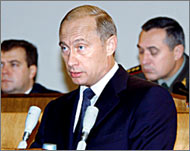US joins criticism of Russian poll
The United States has added its voice to a chorus of Western concern about the fairness of Russia’s parliamentary election.

Russian President Vladimir Putin’s party and its allies triumphed in the weekend parliamentary elections that crushed the Communists and shut liberal parties out of the chamber for the first time in the post-Soviet era.
But international observers have criticised weekend parliamentary elections in Russia, saying they failed to meet many democratic criteria.
Based on pre-election polling, White House spokesman Scott McClellan on Monday said “it appears that the election results roughly reflected the views of the electorate in Russia”.
But he said Washington agreed with the assessment of Europe’s rights and democracy watchdog, the Organisation for Security and Cooperation in Europe, which called the poll “overwhelmingly distorted”.
He said the country’s “media environment and the use of government resources” were of particular concern to the Bush administration, which has enjoyed good relations with Putin’s Kremlin.
Praise and protest
British Prime Minister Tony Blair and German Chancellor Gerhard Schroeder on Monday both congratulated Putin by telephone on the holding of parliamentary elections.
 |
|
United Russia party’s sole aim is |
But a senior official from the OSCE earlier slammed the authorities for misusing state-run television and administrative resources to ensure victory for the pro-Putin party United Russia.
George said that this “led to electoral results being overwhelmingly distorted”.
State-controlled national TV channels propped up United Russia with blanket coverage and attacks on the Communists in the final weeks of the campaign.
The OSCE and Council of Europe rights body deployed around 500 international observers from 43 countries to monitor the State Duma elections on Sunday.
Communist losses
The leading opposition Communist Party suffered devastating
losses and its leader refused to accept the results, accusing the Kremlin of vote-rigging.
|
Early results 1. United Russia 36.8 |
Results issued after nearly 91% of the ballots had been
counted gave Putin’s United Russia party 36.8% of the vote.
Initial analysis suggested the party on its own could get 220 or more seats in the 450-member State Duma lower chamber and possibly win more than 300 seats together with the nationalist Liberal Democratic Party of Russia (LDPR) and Motherland party.
The communists slipped into second place with 12.7% while
nationalist firebrand Vladimir Zhirinovsky and his LDPR party, which also backs Putin, stormed into third place with 11.8%.
Surprise showing
One of the elections’ biggest surprises was the strong showing of Motherland, a three-month-old left-leaning nationalist party that analysts say was created by the Kremlin to steal votes from the Communists. The party grabbed fourth place with 9%.
All the other parties including the two main liberal groups –
the Union of Right Forces (SPS) and Yabloko – failed to cross the 5% threshold needed to win proportional Duma seats, which account for half of the 450-member chamber.
Overall, results showed that power in the Duma was shifting ever further in the Kremlin’s favour at the expense of the leftist opposition that had dominated the legislature in the 1990s, reflecting Putin’s enormous popularity and power in Russia in advance of a presidential election in March.
A two-thirds majority for pro-Kremlin parties would enable Putin to push through changes to the constitution, which limits him to two terms as president, to allow him to remain in power beyond 2008. He is expected to easily win a second term in March.